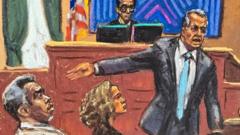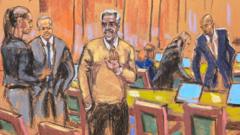On Tuesday, the long-awaited resentencing hearing for Erik and Lyle Menendez will commence, evaluating their eligibility for a reduced sentence after nearly 30 years in prison. This hearing comes after numerous delays and will not be broadcasted publicly. Both sides, defense and prosecution, will present arguments regarding the brothers' actions during their 1989 crime and their conduct while incarcerated.
Menendez Brothers' Resentencing Hearing Marks a New Chapter in a Long-Lasting Saga

Menendez Brothers' Resentencing Hearing Marks a New Chapter in a Long-Lasting Saga
A pivotal resentencing hearing is set to explore the fate of the Menendez brothers, who killed their parents over three decades ago.
The prosecution insists that Erik and Lyle exclusively orchestrated the murders to inherit their parents' wealth, claiming they lack remorse or accountability. On the other hand, the brothers maintain they acted in self-defense stemming from years of alleged abuse at the hands of their father, Jose Menendez, a successful entertainment industry figure. The sensational case has captivated public attention, inspiring a range of media portrayals and discussions each year upon its reemergence in the spotlight.
During the two-day hearing, presiding Judge will review evidence and witness testimonies to determine whether the original life sentences without parole should be amended. Family members, correctional officials, and possibly behavioral scientists may appear to shed light on the brothers' rehabilitation efforts during their decades-long imprisonment. The defense’s strategy may include questioning whether the brothers should take the stand, which could expose them to challenging inquiries from the prosecution.
Already portrayed in numerous series and documentaries, the Menendez brothers' trial in 1993 was a landmark in media coverage, being one of the first major murder trials broadcast live. Their initial trial ended inconclusively, leading to a retrial in 1996 where they were ultimately convicted of first-degree murder, amid controversies regarding the exclusion of their claims of abuse during the proceedings.
With societal and legal attitudes shifting over the past three decades, this resentencing could reflect evolving perspectives on justice and rehabilitation. Adding to the complexity, the recent Netflix dramatization of their story has reignited public interest and spurred debates surrounding their release, especially with notable voices like past Los Angeles District Attorney George Gascón supporting their claims for resentencing. However, current DA Nathan Hochman staunchly opposes their release, arguing they have not accepted full accountability for their actions.
As the resentencing hearing progresses, it raises significant questions about the intersection of justice, accountability, and redemption in a case that remains a poignant topic of discussion.
During the two-day hearing, presiding Judge will review evidence and witness testimonies to determine whether the original life sentences without parole should be amended. Family members, correctional officials, and possibly behavioral scientists may appear to shed light on the brothers' rehabilitation efforts during their decades-long imprisonment. The defense’s strategy may include questioning whether the brothers should take the stand, which could expose them to challenging inquiries from the prosecution.
Already portrayed in numerous series and documentaries, the Menendez brothers' trial in 1993 was a landmark in media coverage, being one of the first major murder trials broadcast live. Their initial trial ended inconclusively, leading to a retrial in 1996 where they were ultimately convicted of first-degree murder, amid controversies regarding the exclusion of their claims of abuse during the proceedings.
With societal and legal attitudes shifting over the past three decades, this resentencing could reflect evolving perspectives on justice and rehabilitation. Adding to the complexity, the recent Netflix dramatization of their story has reignited public interest and spurred debates surrounding their release, especially with notable voices like past Los Angeles District Attorney George Gascón supporting their claims for resentencing. However, current DA Nathan Hochman staunchly opposes their release, arguing they have not accepted full accountability for their actions.
As the resentencing hearing progresses, it raises significant questions about the intersection of justice, accountability, and redemption in a case that remains a poignant topic of discussion.





















